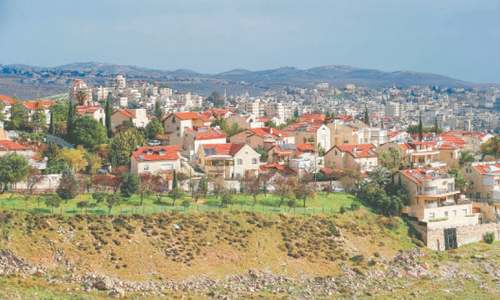BEITA: Israeli settlers left an illegal outpost in the occupied West Bank on Friday in adherence to an agreement struck with nationalist premier Naftali Bennett’s new government, reporters and a settler leader said.
With Israeli military and police on site, the last cars streamed out of Eviatar — near the Palestinian city of Nablus — in compliance with the 4pm deadline to leave the outpost.
“I hope we’ll be back here very soon,” Sarah Lisson, a mother of six, said before driving off. “We can build a big house.”
Dozens of families several weeks ago started to build the settlement in defiance of both international and Israeli law, sparking fierce protests from Palestinians who insisted the Jewish community was being built on their land.
Eviatar leader Tzvi Succot tweeted that he had been the last to leave. “This is a sad moment, but full of hope,” he said.
The settlers had in a matter of weeks built rudimentary concrete homes and set up shacks and tents on a hilltop in the northern West Bank, Palestinian territory occupied by Israel since 1967.
Under the terms of the deal published by the Israeli government on Thursday, the settlers had to leave by Friday afternoon, but their structures can remain and will be guarded by Israel’s military.
The defence ministry said it would study the area to assess whether it could, under Israeli law, be declared state land.
Should that happen, Israel could then authorise a religious school to be built at Eviatar, with residences for its staff and students.
All Jewish settlements in the West Bank are regarded as illegal by most of the international community.
The settlers voiced confidence they would return, even leaving dozens of religious texts behind, lining bookshelves in their makeshift synagogue.
This “land has waited for us for 2,000 years, so another little bit is not such a big (deal),” said Chaim Weltzer, 49, who had been living in Eviatar with his family for nine weeks.
He insisted that the West Bank, as well parts of neighbouring Syria and Jordan, was territory promised to Jews in the Old Testament, and which one day would become part of the Jewish state.
“We know the end of the story,” Weltzer said.
The Palestinians, who claim the land as their own, had harassed the settlers by burning car tyres, sounding horns and pointing laser beams at them, leading to deadly clashes with Israeli security forces.
On Friday, Palestinians were again gathering across the valley to protest, hurling stones and burning tyres.
The dispute around the flashpoint site put an early strain on Bennett’s diverse eight-party coalition, that includes his right-wing nationalist Yamina party as well as left-wing groups and Arab-Israeli lawmakers.
The deal was rejected by leftwing Israeli groups, as well as the mayor of Beita, the nearby Palestinian village, who said on Thursday that “clashes and protests will continue” as long as any Israeli “remains on our land”.
Published in Dawn, July 3rd, 2021















































